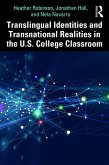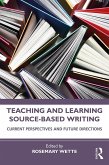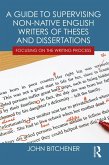Generation 1.5 in College Composition (eBook, ePUB)
Teaching Academic Writing to U.S.-Educated Learners of ESL
Redaktion: Roberge, Mark; Harklau, Linda; Siegal, Meryl
56,95 €
56,95 €
inkl. MwSt.
Sofort per Download lieferbar

28 °P sammeln
56,95 €
Als Download kaufen

56,95 €
inkl. MwSt.
Sofort per Download lieferbar

28 °P sammeln
Jetzt verschenken
Alle Infos zum eBook verschenken
56,95 €
inkl. MwSt.
Sofort per Download lieferbar
Alle Infos zum eBook verschenken

28 °P sammeln
Generation 1.5 in College Composition (eBook, ePUB)
Teaching Academic Writing to U.S.-Educated Learners of ESL
Redaktion: Roberge, Mark; Harklau, Linda; Siegal, Meryl
- Format: ePub
- Merkliste
- Auf die Merkliste
- Bewerten Bewerten
- Teilen
- Produkt teilen
- Produkterinnerung
- Produkterinnerung

Bitte loggen Sie sich zunächst in Ihr Kundenkonto ein oder registrieren Sie sich bei
bücher.de, um das eBook-Abo tolino select nutzen zu können.
Hier können Sie sich einloggen
Hier können Sie sich einloggen
Sie sind bereits eingeloggt. Klicken Sie auf 2. tolino select Abo, um fortzufahren.

Bitte loggen Sie sich zunächst in Ihr Kundenkonto ein oder registrieren Sie sich bei bücher.de, um das eBook-Abo tolino select nutzen zu können.
Building on the work that has been done over the past decade, this volume provides theoretical frameworks for understanding debates about immigrant students, studies of students' schooling paths and language and literacy experiences, and pedagogical approaches for working with Generation 1.5 students.
- Geräte: eReader
- mit Kopierschutz
- eBook Hilfe
- Größe: 0.63MB
Andere Kunden interessierten sich auch für
![Generation 1.5 Meets College Composition (eBook, ePUB) Generation 1.5 Meets College Composition (eBook, ePUB)]() Generation 1.5 Meets College Composition (eBook, ePUB)33,95 €
Generation 1.5 Meets College Composition (eBook, ePUB)33,95 €![Generation 1.5 in College Composition (eBook, PDF) Generation 1.5 in College Composition (eBook, PDF)]() Generation 1.5 in College Composition (eBook, PDF)56,95 €
Generation 1.5 in College Composition (eBook, PDF)56,95 €![Translingual Identities and Transnational Realities in the U.S. College Classroom (eBook, ePUB) Translingual Identities and Transnational Realities in the U.S. College Classroom (eBook, ePUB)]() Heather RobinsonTranslingual Identities and Transnational Realities in the U.S. College Classroom (eBook, ePUB)39,95 €
Heather RobinsonTranslingual Identities and Transnational Realities in the U.S. College Classroom (eBook, ePUB)39,95 €![Teaching and Learning Source-Based Writing (eBook, ePUB) Teaching and Learning Source-Based Writing (eBook, ePUB)]() Teaching and Learning Source-Based Writing (eBook, ePUB)43,95 €
Teaching and Learning Source-Based Writing (eBook, ePUB)43,95 €![A Guide to Supervising Non-native English Writers of Theses and Dissertations (eBook, ePUB) A Guide to Supervising Non-native English Writers of Theses and Dissertations (eBook, ePUB)]() John BitchenerA Guide to Supervising Non-native English Writers of Theses and Dissertations (eBook, ePUB)33,95 €
John BitchenerA Guide to Supervising Non-native English Writers of Theses and Dissertations (eBook, ePUB)33,95 €![L2 Writing in Secondary Classrooms (eBook, ePUB) L2 Writing in Secondary Classrooms (eBook, ePUB)]() L2 Writing in Secondary Classrooms (eBook, ePUB)52,95 €
L2 Writing in Secondary Classrooms (eBook, ePUB)52,95 €![Linguistic Minority Students Go to College (eBook, ePUB) Linguistic Minority Students Go to College (eBook, ePUB)]() Linguistic Minority Students Go to College (eBook, ePUB)47,95 €
Linguistic Minority Students Go to College (eBook, ePUB)47,95 €-
-
-
Building on the work that has been done over the past decade, this volume provides theoretical frameworks for understanding debates about immigrant students, studies of students' schooling paths and language and literacy experiences, and pedagogical approaches for working with Generation 1.5 students.
Dieser Download kann aus rechtlichen Gründen nur mit Rechnungsadresse in A, B, BG, CY, CZ, D, DK, EW, E, FIN, F, GR, HR, H, IRL, I, LT, L, LR, M, NL, PL, P, R, S, SLO, SK ausgeliefert werden.
Produktdetails
- Produktdetails
- Verlag: Taylor & Francis eBooks
- Seitenzahl: 288
- Erscheinungstermin: 12. Februar 2009
- Englisch
- ISBN-13: 9781135591304
- Artikelnr.: 38245114
- Verlag: Taylor & Francis eBooks
- Seitenzahl: 288
- Erscheinungstermin: 12. Februar 2009
- Englisch
- ISBN-13: 9781135591304
- Artikelnr.: 38245114
- Herstellerkennzeichnung Die Herstellerinformationen sind derzeit nicht verfügbar.
Mark Roberge is Associate Professor in the Composition program at San Francisco State University. Meryl Siegal is Instructor of English at Laney College in Oakland, California. Linda Harklau is Professor in the Teaching Additional Languages program and Linguistics program at the University of Georgia.
@contents: Selected Contents
Introduction
Generation 1.5 ten years later, Mark Roberge, Meryl Siegal and Linda
Harklau
Section One: Frameworks for understanding Generation 1.5
1. Approaching Generation 1.5 through immigrant studies and
socio-political/socio-economic frameworks, Vivian Louie
2. Language minorities in higher education-What we (don't) know, Linda
Harklau
3. The complex linguistic situation of Generation 1.5 students, Mary
Schmida
4. The Erasure of Resident ESL Writers, Paul Kei Matsuda and Aya Matsuda
Section Two: Generation 1.5 student characteristics and schooling paths
1. Generation 1.5 immigrant ESL students: What experiences,
characteristics and needs might they bring to our English classes?
Mark Roberge
2. Academic reading and writing challenges and strategies used to meet
those challenges: A case of four undergraduate Generation 1.5
students, Cathryn Crosby
3. At what price success? The academic writing development of a
Generation 1.5 latecomer, Jan Frodesen
4. Generation 1.5 students and the hegemony of dominant language
ideologies, Jennifer A. Mott-Smith
5. Accessing academic literacy in college: Pathways of U.S.-educated
English language learners, Genevieve Patthey-Chavez, Joan
Thomas-Spiegel, and Paul Dillon
Section Three: Pedagogical approaches for Generation 1.5
1. Pedagogical principles and practices for working with Generation 1.5,
Patricia Porter, Deborah VanDommelen, Sugie Goen-Salter, and Deborah
Swanson
2. Reading/writing connections for Generation 1.5, Harriett Allison
3. Vocabulary and reading for Generation 1.5, Cheryl Benz
A functional focus on language: Grammar for Generation 1.5, Mary J.
Schleppegrell
1. Socioliterate pedagogy for Generation 1.5, Ann Johns
2. Charting new territory: Creating an interdepartmental writing course
for Generation 1.5, Christine Holten
3. Individualizing pedagogy: Working with diverse needs and goals in
freshman composition for international students and Generation 1.5,
Dudley Reynolds, Kyung-Hee Bae and Jennifer Shade Wilson
Situating language and academic literacy development into a
curriculum of first-year college courses for Generation 1.5, Robin
Murie
4. Promoting Generation 1.5 learners' academic literacy and autonomy:
Pedagogical approaches from the learning center, Margi Wald and
Nathalie Destandau
Conclusion
Where do we go from here? Mark Roberge, Meryl Siegal and Linda Harklau
Introduction
Generation 1.5 ten years later, Mark Roberge, Meryl Siegal and Linda
Harklau
Section One: Frameworks for understanding Generation 1.5
1. Approaching Generation 1.5 through immigrant studies and
socio-political/socio-economic frameworks, Vivian Louie
2. Language minorities in higher education-What we (don't) know, Linda
Harklau
3. The complex linguistic situation of Generation 1.5 students, Mary
Schmida
4. The Erasure of Resident ESL Writers, Paul Kei Matsuda and Aya Matsuda
Section Two: Generation 1.5 student characteristics and schooling paths
1. Generation 1.5 immigrant ESL students: What experiences,
characteristics and needs might they bring to our English classes?
Mark Roberge
2. Academic reading and writing challenges and strategies used to meet
those challenges: A case of four undergraduate Generation 1.5
students, Cathryn Crosby
3. At what price success? The academic writing development of a
Generation 1.5 latecomer, Jan Frodesen
4. Generation 1.5 students and the hegemony of dominant language
ideologies, Jennifer A. Mott-Smith
5. Accessing academic literacy in college: Pathways of U.S.-educated
English language learners, Genevieve Patthey-Chavez, Joan
Thomas-Spiegel, and Paul Dillon
Section Three: Pedagogical approaches for Generation 1.5
1. Pedagogical principles and practices for working with Generation 1.5,
Patricia Porter, Deborah VanDommelen, Sugie Goen-Salter, and Deborah
Swanson
2. Reading/writing connections for Generation 1.5, Harriett Allison
3. Vocabulary and reading for Generation 1.5, Cheryl Benz
A functional focus on language: Grammar for Generation 1.5, Mary J.
Schleppegrell
1. Socioliterate pedagogy for Generation 1.5, Ann Johns
2. Charting new territory: Creating an interdepartmental writing course
for Generation 1.5, Christine Holten
3. Individualizing pedagogy: Working with diverse needs and goals in
freshman composition for international students and Generation 1.5,
Dudley Reynolds, Kyung-Hee Bae and Jennifer Shade Wilson
Situating language and academic literacy development into a
curriculum of first-year college courses for Generation 1.5, Robin
Murie
4. Promoting Generation 1.5 learners' academic literacy and autonomy:
Pedagogical approaches from the learning center, Margi Wald and
Nathalie Destandau
Conclusion
Where do we go from here? Mark Roberge, Meryl Siegal and Linda Harklau
@contents: Selected Contents
Introduction
Generation 1.5 ten years later, Mark Roberge, Meryl Siegal and Linda
Harklau
Section One: Frameworks for understanding Generation 1.5
1. Approaching Generation 1.5 through immigrant studies and
socio-political/socio-economic frameworks, Vivian Louie
2. Language minorities in higher education-What we (don't) know, Linda
Harklau
3. The complex linguistic situation of Generation 1.5 students, Mary
Schmida
4. The Erasure of Resident ESL Writers, Paul Kei Matsuda and Aya Matsuda
Section Two: Generation 1.5 student characteristics and schooling paths
1. Generation 1.5 immigrant ESL students: What experiences,
characteristics and needs might they bring to our English classes?
Mark Roberge
2. Academic reading and writing challenges and strategies used to meet
those challenges: A case of four undergraduate Generation 1.5
students, Cathryn Crosby
3. At what price success? The academic writing development of a
Generation 1.5 latecomer, Jan Frodesen
4. Generation 1.5 students and the hegemony of dominant language
ideologies, Jennifer A. Mott-Smith
5. Accessing academic literacy in college: Pathways of U.S.-educated
English language learners, Genevieve Patthey-Chavez, Joan
Thomas-Spiegel, and Paul Dillon
Section Three: Pedagogical approaches for Generation 1.5
1. Pedagogical principles and practices for working with Generation 1.5,
Patricia Porter, Deborah VanDommelen, Sugie Goen-Salter, and Deborah
Swanson
2. Reading/writing connections for Generation 1.5, Harriett Allison
3. Vocabulary and reading for Generation 1.5, Cheryl Benz
A functional focus on language: Grammar for Generation 1.5, Mary J.
Schleppegrell
1. Socioliterate pedagogy for Generation 1.5, Ann Johns
2. Charting new territory: Creating an interdepartmental writing course
for Generation 1.5, Christine Holten
3. Individualizing pedagogy: Working with diverse needs and goals in
freshman composition for international students and Generation 1.5,
Dudley Reynolds, Kyung-Hee Bae and Jennifer Shade Wilson
Situating language and academic literacy development into a
curriculum of first-year college courses for Generation 1.5, Robin
Murie
4. Promoting Generation 1.5 learners' academic literacy and autonomy:
Pedagogical approaches from the learning center, Margi Wald and
Nathalie Destandau
Conclusion
Where do we go from here? Mark Roberge, Meryl Siegal and Linda Harklau
Introduction
Generation 1.5 ten years later, Mark Roberge, Meryl Siegal and Linda
Harklau
Section One: Frameworks for understanding Generation 1.5
1. Approaching Generation 1.5 through immigrant studies and
socio-political/socio-economic frameworks, Vivian Louie
2. Language minorities in higher education-What we (don't) know, Linda
Harklau
3. The complex linguistic situation of Generation 1.5 students, Mary
Schmida
4. The Erasure of Resident ESL Writers, Paul Kei Matsuda and Aya Matsuda
Section Two: Generation 1.5 student characteristics and schooling paths
1. Generation 1.5 immigrant ESL students: What experiences,
characteristics and needs might they bring to our English classes?
Mark Roberge
2. Academic reading and writing challenges and strategies used to meet
those challenges: A case of four undergraduate Generation 1.5
students, Cathryn Crosby
3. At what price success? The academic writing development of a
Generation 1.5 latecomer, Jan Frodesen
4. Generation 1.5 students and the hegemony of dominant language
ideologies, Jennifer A. Mott-Smith
5. Accessing academic literacy in college: Pathways of U.S.-educated
English language learners, Genevieve Patthey-Chavez, Joan
Thomas-Spiegel, and Paul Dillon
Section Three: Pedagogical approaches for Generation 1.5
1. Pedagogical principles and practices for working with Generation 1.5,
Patricia Porter, Deborah VanDommelen, Sugie Goen-Salter, and Deborah
Swanson
2. Reading/writing connections for Generation 1.5, Harriett Allison
3. Vocabulary and reading for Generation 1.5, Cheryl Benz
A functional focus on language: Grammar for Generation 1.5, Mary J.
Schleppegrell
1. Socioliterate pedagogy for Generation 1.5, Ann Johns
2. Charting new territory: Creating an interdepartmental writing course
for Generation 1.5, Christine Holten
3. Individualizing pedagogy: Working with diverse needs and goals in
freshman composition for international students and Generation 1.5,
Dudley Reynolds, Kyung-Hee Bae and Jennifer Shade Wilson
Situating language and academic literacy development into a
curriculum of first-year college courses for Generation 1.5, Robin
Murie
4. Promoting Generation 1.5 learners' academic literacy and autonomy:
Pedagogical approaches from the learning center, Margi Wald and
Nathalie Destandau
Conclusion
Where do we go from here? Mark Roberge, Meryl Siegal and Linda Harklau







